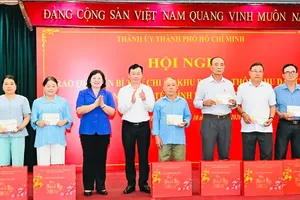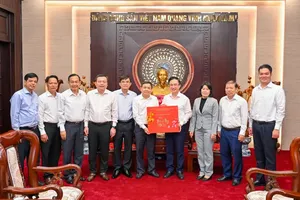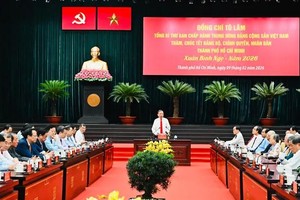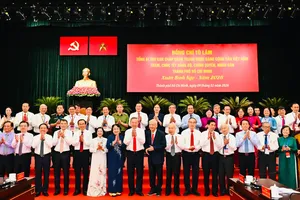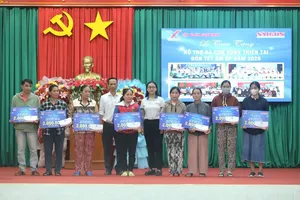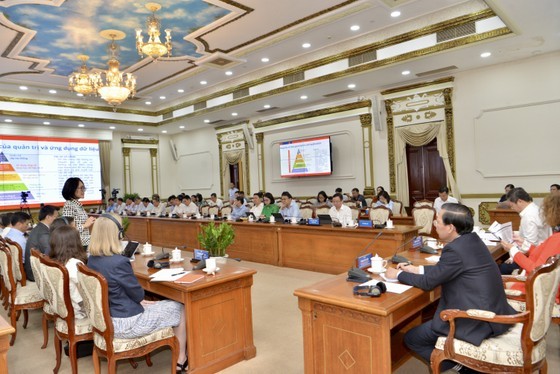 |
At the meeting |
The People's Committee of Ho Chi Minh City today organized an event to launch the city’s Data Governance Strategy until 2025, with a vision to 2030.
The event saw the participation of Chairman of the municipal People's Committee Phan Van Mai and his and Vice Chairman Duong Anh Duc, World Bank’s Country Director for Vietnam Carolyn Turk, Consul General of Australia in Ho Chi Minh City Sarah Hooper, experts from the World Bank in Vietnam, experts in Singapore and representatives of departments.
Talking with the leaders of Ho Chi Minh City, Ms. Carolyn Turk emphasized the importance of the Data Governance Strategy and suggested that Ho Chi Minh City continue to invest in proper institutional arrangements for managing the city’s data assets securely and maximizing the value of the city data assets. Creating a dedicated unit for data management and digital transformation will be critical to ensure that this Data Governance Strategy of the city and other related important policy documents are translated into concrete actions and results.
In particular, a dedicated unit for data management and digital transformation has an important role in ensuring the city's data governance strategy. In this respect, the World Bank stands ready to provide Ho Chi Minh City with global knowledge, top-notched advice through the reimbursable advisory services (RAS) modality, and financing as well if eventually the city so needs, with the existing financing modalities, for viable business models of the city’s data-related or digital transformation initiatives. Only with that, can digital transformation reform actions spur further productivity, competitiveness, and socio-economic development in the city.
Ms. Sarah Hooper, Australian Consul General in Ho Chi Minh City, hoped that the City's Data Governance Strategy will be effectively implemented to meet the needs of city leaders in taking advantage of the city's data to make better decisions and strengthen HCMC's digital economy and digital society.
At the conference, Chairman of Ho Chi Minh City People's Committee Phan Van Mai thanked the World Bank in Vietnam, the Australian Consulate General in Ho Chi Minh City and experts for helping Ho Chi Minh City build a smart city project. Mr. Mai announced that having a good strategy is a success but the implementation of good strategy for the building of digital government, the development of the digital economy and digital society and the building the city into a smart city is more important.
He emphasized that Ho Chi Minh City urgently needs international cooperation because the city can’t be successful with self-reliance. He added that in the digital transformation of the city and building Ho Chi Minh City into a smart city is as important as building the city's general data.
The head of the city government expected that the World Bank, the Australian Consulate General in Ho Chi Minh City and experts will continue to support the city throughout the implementation of the Data Governance Strategy.
Mr. Phan Van Mai suggested, in the coming time, agencies need to continue to focus highly so that they will implement their task well to ensure the Data Governance Strategy of Ho Chi Minh City. By 2025, the orientation to 2030 will be effective. In addition, departments and agencies must closely coordinate with relevant sectors and organizations to create specialized databases to develop and use data effectively.
He requested that the City Department of Information and Communications and the Department of Home Affairs of Ho Chi Minh City should have a piece of advice for the establishment of the Ho Chi Minh City Digital Transformation Center to connect departments, districts and Thu Duc City in implementing tasks on digital transformation in the first 6 months.
Previously, at the beginning of February 2023, the People's Committee of Ho Chi Minh City approved the Data Governance Strategy of Ho Chi Minh City until 2025, with a vision to 2030. The Strategy is a concrete result of the on-going fruitful collaboration between the World Bank and Ho Chi Minh City under the joint HCMC-WBG integrated engagement and in the digital transformation reform agenda for the period 2022 – 2023. The strategy's goal is to unleash the potential of data to enhance the efficiency of city government agencies and provide responsive and effective services for city residents; thereby, contributing to the development of a comprehensive digital economy.
The strategy for creating databases and foundational information systems will serve the goal of digital transformation and building a smart city of the city; promote the exchange, use and reuse of data among city government agencies towards data-driven governance and decision-making; Moreover, the strategy standardize data groups to ensure connection, sharing, and application of the National Population Database, contributing to speeding up the implementation of the Prime Minister’s Decision No. 06/QD-TTg.
From now to 2025, the Data Strategy of Ho Chi Minh City focuses on three main data groups including data about people namely administrative, civil status, health, education and welfare data groups; group of financial - business data comprising summarizing and making statistics of budget revenues and expenditures, public investment management, enterprises - individual business households; group of data on land - urban areas such as land, geographical information management, construction, transportation, planning - architecture.
The city strives to achieve some key targets by 2025. For instance, all management information system on land, construction permits, and planning will be formed uniformly in Ho Chi Minh City, completion of people's electronic health record data, welfare data, data on the establishment and operation of enterprises and individual business households, data on budget revenue and expenditure, disbursement of public investment.
